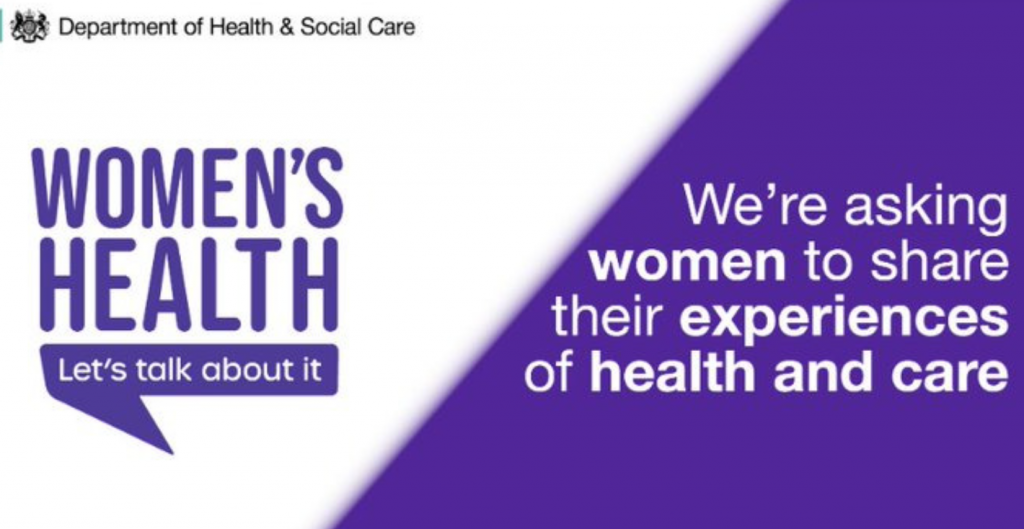by Daisy Payling
On International Women’s Day in March 2021 the Government Department of Health and Social Care announced a call for submissions of evidence to inform the development of a Women’s Health Strategy.
The call acknowledged that the health and care system had to this point been designed ‘by men for men’ and that this had ramifications for women’s health contributing to poorer advice, diagnosis and worse outcomes. The call aimed to put ‘women’s voices at the centre’ of a strategy to tackle these ‘health inequalities and the wider determinants of health’.

Women’s voices
As part of our research, we have conducted oral history interviews with ninety-one women born between 1940 and 1970, which are due to be archived at the British Library in 2022. These interviews employ a life-course approach, exploring how women’s everyday health experiences, including medical encounters, their emotional wellbeing, and their thoughts and feelings about their bodies, have changed across the course of their lives. We asked women about topics relating to their childhood health, their experiences of puberty, their sexuality and relationships, the trajectory of their working lives and its impact on their wellbeing, having or not having children, their social activities, the menopause, and ageing. As a result, the interviews are a rich resource for understanding women’s lived experiences of the healthcare system in Britain across their life course. Lived experience research helps us to understand how women’s individual lives are informed by wider developments in healthcare policy and provision. In acknowledging how life experiences are shaped by different factors of an individual’s identity, including race, class, gender, sexuality, and religion, lived experience research also sheds light on how health inequalities are perpetuated within society, with the view to eradicate them.[1]
Our interviews provide valuable evidence for the Women’s Health Strategy. In her ministerial foreword for the Strategy, Nadine Dorries MP cited the importance of adopting a holistic approach to women’s health that acknowledges women’s changing health and care needs across their lives, and the impact of specific life events or stages of life on women’s wellbeing. Our interviews demonstrate that a life-course approach to women’s health should not view women’s medical encounters in isolation. Rather, these encounters should be situated within the context of women’s broader lived experiences, recognising the memories and emotions that accompany the myriad of medical interventions and encounters that occur over the course of women’s lives.
We presented our evidence by exploring the emotional impact of poor treatment on women’s lives, the effects of poor treatment on women’s relationships with the NHS, factors that restrict women’s capacity to complain following mistreatment, and examples of women’s positive experiences within the NHS.
A summary of our evidence
Our interviews with women suggest that understanding women’s experiences of healthcare across their lives means more than focussing on how health needs change at key moments like childbirth or menopause. It means acknowledging that women’s health needs and experiences are shaped by previous medical encounters, relationships and caring responsibilities, and aspects of identity such as gender, class, ethnicity and sexuality. Our submission highlighted many negative medical encounters experienced by women as well as some positive ones. It showed how negative experiences, such as poor communication, insensitive behaviour, being ‘told off’, missed and incorrect diagnoses, and having to push for treatment, often have long lasting emotional effects as well as physical consequences. Negative experiences clearly affect women’s relationships with the health service and how they seek out treatment and interact with medical practitioners going forward. Women’s lack of agency can be exacerbated by barriers to complaint or failures to acknowledge complaints by the health service. Other research has found that BAME and LGBTQ+ women face additional barriers to healthcare, and there have been notable studies on the inequality of outcomes for BAME women and babies, and on access to gendered cancer screening for women who have sex with women.[2]
Our findings and those of others reiterate the need for patient-centred care, where women are treated as whole people, listened to, treated with respect and encouraged to work with medical practitioners. Our work with medical students outlines that though medical students are often aware that this is how they should treat patients, they worry that understaffing caused by underfunding in the health service will prevent them from being able to provide this care. We recommended that a patient-centred approach is built into the health system at every level.
What happens next?
Many other organisations with an interest in women’s health have made recommendations. Recommendations made by the Royal College of Obstetricians and Gynaecologists included a commitment to funding evidence-led campaigns and projects that aim to reduce stigma around women’s health, reinforcing the requirement for the introduction of Relationships and Sex Education (RSE) in schools, and setting a target of a 50% reduction in the disparity in maternal mortality rates for Black, Asian and minority ethnic women in the next five years.
Although the commitment to listening to women’s voices outlined by the Women’s Health Strategy is a welcome one, the King’s Fund questioned whether the voices of all women were being heard. As the King’s Fund reported, women from disadvantaged groups are least likely to have their voices heard and ‘the initial response rate to the call for evidence from some groups was so low’ that the deadline for submissions was extended by two weeks. Women from Asian and minority ethnic backgrounds and women over 50 were further encouraged to submit evidence. The British Medical Association also included within its recommendations that a comprehensive strategy for women’s health be ‘inclusive of the specific healthcare needs of transgender and non-binary individuals’, including that ‘transgender and non-binary individuals can access routine healthcare services in line with their gender presentation’.
There has since been a change in leadership of the DHSC with
Sajid Javid replacing Matt Hancock as Secretary of State for Health and Social
Care in June 2021, and Nadine Dorries becoming the Secretary of State for
Digital, Culture, Media and Sport in the September 2021 reshuffle.
Nevertheless, the DHSC will be analysing the evidence collected and preparing a
strategy. It remains to be seen how effective this listening exercise will have
been and what shape the Women’s Health Strategy will take.
[1] Robin M. Boylorn, ‘Lived Experience’ in Lisa M. Given, The SAGE Encyclopedia of Qualitative Research Methods (SAGE: Thousand Oaks, 2012), p. 490
[2] Public Health England, ‘Maternity high impact area: Reducing the inequality of outcomes for women from Black, Asian and Minority Ethnic (BAME) communities and their babies’, (London: Public Health England, 2020); Public Health England, ‘Improving the health and wellbeing of lesbian and bisexual women and other women who have sex with women’ (London: Public Health England, 2018).

